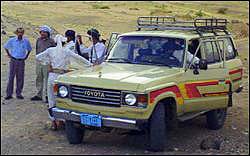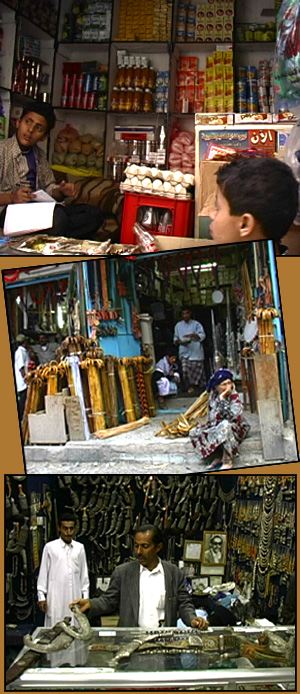©ViewZone Expedition 2001
|
Once you are in Yemen, your money will go a long way. During the Expedition 2001 we were getting about 16000 YR (Yemeni Rials) for a one hundred U.S. dollar bill. Always bring new, clean, unwrinkled bills as the Yemeni money changers will simply reject any bill prior to 1991 or which looks old or questionable. In fact it is not something unique to Yemen. In most European countries and Australia we found the same precautions. The most common bill used in Yemen is the 100 YR. Coinage is nil. Almost everything of value is in multiples of 100 YR. The bills are often secured in a roll with an elastic band instead of a wallet or billfold. Prices are very stable in Yemen but they can vary from metropolitan areas like Sana'a or Aden to more rural areas. A cup of coffee in Sana'a top hotel will cost 300 YR while the same cup of Joe will be 50 YR in the corner eatery. Canned soda is 200 YR.
If you are ready to eat Yemeni food you will find that your expenses can be limited to under 800 YR a day. The food is exceptionally healthy with fresh ingredients and low fat. Your body will quickly thank you for passing up the overpriced hotel buffet. I lost over 40 pounds while a certain thin member of the crew actually gained weight. Most Yemeni eat very light breakfasts. Usually this will consist of a hot cup of shai or weak coffee made from the shells of the coffee bean and often served with ginger. Small round rolls or flatbread are served with honey or cheese. The real meal is in mid-day, when men seek the cool shade of the local restaurant. Head gear comes down off the head and rests on the shoulders like colorful shawls while small individual portions of chicken broth are served with fresh baked flat bread. Gradually, more small dishes are brought to the table containing yogurt, sliced limes, pieces of chicken, grilled vegetables and at least one mystery dish that could be either camel or goat. More flat bread is placed on the table and some fruit is added to the selection. I preferred the "Broiste," or chicken dishes. All of this food is part of the traditional Yemen lunch and will cost you about 300 YR. Hands are the utensils in Yemen and the flat bread is used to cradle the morsels after they are scooped up from the communal bowls. Supper usually cost about 400 YR and is finished with a round of sweet tea. After the tea, men will usually go in search of fresh qat, a leafy plant that is chewed in a large wad inside the cheek. Qat is many things: an after meal treat, a coffee-like stimulant, an antidepressant, and quite necessary to Yemen culture. Even governmental meetings often include a break in the business for a qat chew. I was told more than once, "You are now truly Yemeni!" because I had a cheek full of the tender young leaves. Qat is a mild stimulant that also produces its own characteristic state of euphoria. It is embedded in Yemeni culture and is everywhere. Qat is chewed from mid-day to late evening but does not impede work or slow the afternoon pace of life. If anything, qat seems to be a social lubricant that allows the expression affection among the people. I can't personally tell you what qat does or why it is so popular because, for me, it was nothing more than a strange way to drink a cup of coffee. A small bag of qat can cost from 800 to 2000 YR, depending on the quality and source. Yemeni men usually spend the equivalent of from 5 to 8 U.S. dollars for a supply of qat. This stash is usually shared with other men in traditional "chews" where business and politics are openly discussed. Supper depends on the amount of qat that has been chewed, as this can dramatically reduce the appetite. If you don't chew, then you can expect a repeat of the lunch menu followed by tea or coffee. There are no alcoholic beverages in Yemen except, very rarely, in 5-star hotels. Cigarettes are cheap -- only 100 YR per pack -- the price of a stamp. You will find the most popular brand is Kamaran, an ultra-light blend that kept our smoking members satisfied when their own brands or Pall Mall were unavailable.

Drinking water, the only daily necessity, will run you only 25 YR per bottle in most roadside markets (4 for 100 YR). It is available in plastic bottles everywhere and is pure. A few shai bags in a bottle of water will yield a pleasant sun-tea in less than 20 minutes. The same technique works well with limes. Fruits and vegetables are extremely inexpensive, especially at the food suqs (markets).
Getting Around in Yemen
Hotels outside major cities will run you from 800 to 2000 YR a night and usually provide you with a bed, sheets, lights and an electric ceiling fan. Bathrooms are usually down the end of the hall and are European style, but not always. If you don't want to experience unfamiliar or unpleasant plumbing you might want to stick to the more expensive, 5-star hotels. There are plenty of these facilities catering to Western tastes and their cost varies from 10,000 to 20,000 YR (60 to 120 U.S. dollars) a night.
|
|
Transportation is something that most tourists will require. There are no trains or subways in Yemen but there is an excellent system of roads and highways. Driving is not advised except if you are either an Indie race driver or a Manhattan cabby. To get around you will need a taxi or a driver with a vehicle. A good driver with a roomy Toyota Land Cruiser will cost you about 50 U.S. dollars per day.
ViewZone's Toyota Land Cruiser [right] was driven by Abdul. The best driver in Yemen, and was to be our home for five weeks on the road.
| 
|
|
Buying SOUVENIRS
Batteries aren't souvenirs but they often are vital to our cameras. Bad batteries can cause lost memories and images. Unless you can test the battery with a self-test strip don't waste money on batteries in Yemen. Many batteries are black market, low energy rip-offs that have already survived a hot trip across the desert from Saudi Arabia. They will power a flashlight for about 20 minutes and will drop dead in your camera after only a dozen pictures. Stick with electronics vendors in large cities for the most reliable supply and, when you do find fresh batteries, always buy extras. Good AA batteries will run you about 200 YR each.
If you are planning to use electrical equipment from the States, visit an electronic suq when you arrive and pick up an electrical plug adapter to mate your US plug with the many varieties of outlets that you will find in Yemen. An adapter will cost you about 700 YR and you will need a couple of different types as you traverse this land. The double round poles and the three-pronged straight plugs are most popular. In some 5-star hotels a 240/115 volt adapter is provided for electric razors but these are unreliable.
Yemen is famous for its suqs or open markets. Each town or village usually has a specific day or days that the markets will be open and these afford an opportunity for farmers and rural families to buy and sell their goods amidst the hustle bustle of the many smells and sounds. Within each market area there are specific suqs that specialize in things like cooked food, livestock, grains, electrical appliances, automotive parts and qat. Knowing which days and which suqs are open can save you lots of money when buying certain items.
Bargaining is not supposed to exist in Yemen, but we noticed the quoted prices rapidly diminished with our disinterest in a merchant's wares. The same jambia (curved knife work by virtually all Yemeni men) can be 4000 Ryals if you are wide-eyed and eager and only 2000 if you decide to say "La!" (No!). Jewelry is another item that can vary. Don't wonder if a particular necklace is really made of pure silver or not. In these jewelry suqs the rule is if you like it then buy it. Even the non-precious jewelry is so exotic and the craftsmanship so fine that it is always worth more than the asking price. Passing them up will only haunt you back home.
If you spend any time at a particular store or booth in a suq, you will doubtless be offered a cup of tea, called shai. This is a friendly tradition that allows the merchant to get to know you while showing their special wares. The large, inexpensive drums of saffron (a fortune in American markets) reminded us that Yemen is ideal for buying rare ingredients like frankincense or rare spices. Doubtless you will see many things that you need -- or didn't know you needed -- in the various suqs. Everything is inexpensive and you will find that you have not just made a purchase but you have made a friend of the local merchant.
Back to Yemen |
 Buying FOOD
Buying FOOD